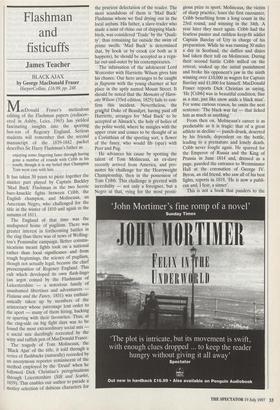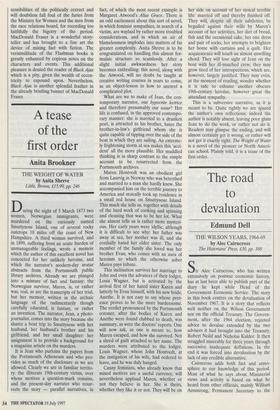Flashman and fisticuffs
James Teacher
BLACK AJAX by George MacDonald Fraser HarperCollins, £16.99, pp. 248 MacDonald Fraser's meticulous editing of the Flashman papers (rediscov- ered in Ashby, Leics. 1965) has yielded fascinating insights into the sporting hon-ton of Regency England. Serious students will remember that the second manuscript of the 1839-1842 packet describes Sir Harry Flashman's father as
enjoying some lingering fame through having gone a number of rounds with Cribb in his youth, though it is my belief that Champion Tom went easy with him .. .
It has taken 30 years to piece together the sinister part played by Captain Buckley `Mad Buck' Flashman in the two heroic bare-knuckle fights between Cribb, the English champion, and Molineaux, an American Negro, who challenged for the title in the winter of 1810 and again in the autumn of 1811.
The England of that time was the undisputed home of pugilism. There was greater interest in forthcoming battles in the ring than there was of news of Welling- ton's Peninsular campaign. Better commu- nications meant fights took on a national rather than local significance and from rough beginnings, the science of pugilism, though not actually legal, became the chief preoccupation of Regency England. This cult which developed its own flash-lingo (an argot coined by the Flashmans of Leicestershire — a notorious family of unashamed libertines and adventurers — Fistiana and the Fancy, 1831) was enthusi- astically taken up by members of the aristocracy whose patronage lent order to the sport — many of them hiring, backing or sparring with their favourites. Thus, at the ring-side on big fight days was to be found the most extraordinary social mix a social mix dazzlingly recreated by the witty and raffish pen of MacDonald Fraser. The tragedy of Tom Molineaux, the `Black Ajax' of the title, it told through a series of flashbacks (naturally) recorded by an anonymous reporter reminiscent of the method employed by the 'Druid' when he followed Dick Christian's peregrinations through Leicestershire (Silk and Scarlet, 1859). This enables our author to parade a motley selection of dubious characters for the prurient delectation of the reader. The most scandalous of them is 'Mad Buck' Flashman whom we find drying out in the local asylum. His father, a slave-trader who made a mint of rhino out of shipping black- birds, was considered 'Trade' by the 'Quali- ty', thus remaining far outside the swim of prime swells. 'Mad Buck' is determined that, by hook or by crook (or both as it happens), he should be accepted as a regu- lar out-and-outer by his contemporaries.
The infatuation of the adolescent Lord Worcester with Harriette Wilson gives him his chance. Our hero arranges to be caught in flagrante with the young charmer at her place in the aptly named Mount Street. It should be noted that the Memoirs of Harri- ette Wilson (33rd edition, 1825) fails to con- firm this incident. Nevertheless, the gratgful Duke of Beaufprt, having paid off Harriette, arranges for 'Mad Buck' to be accepted at Almack's, the holy of holies of the polite world, where he mingles with the upper crust and comes to be thought of as a Corinthian of the sporting sort, a flower of the fancy, who would fib (spar) with Peer and Pug.
He advances his cause by spotting the talent of Tom Molineaux, an ex-slave recently arrived from America, and pro- motes his challenge for the Heavyweight Championship, then in the possession of Tom Cribb. This challenge is greeted with incredulity — not only a foreigner, but a Negro at that, vying for the most presti- gious prize in sport. Molineaux, the victim of sharp practice, loses the first encounter, Cribb benefiting from a long count in the 23rd round, and winning in the 34th. A year later they meet again. Cribb had the fearless punter and ruthless keep-fit addict Captain Barclay of Ury in charge of his preparation. While he was running 30 miles a day in Scotland, the daffies and dbdes had taken their toll on Molineaux. During their second battle Cribb milled on the retreat, soaked up the initial punishment and broke his opponent's jaw in the ninth winning over £10,000 in wagers for Captain Barclay and £1,000 for himself. MacDonald Fraser reports Dick Christian as saying, `He [Cribb] was in beautiful condition, fine as a star, just like snow aside a black man'. For some curious reason, he omits the next sentence: 'The black wur fat — that licked him as much as anything.'
From then on, Molineaux's career is as predictable as it is tragic: that of a great athlete in decline — punch-drunk, deserted by his friends, dependent on the bottle, leading to a premature and lonely death. Cribb never fought again. He sparred for the Emperor of Russia and the King of Prussia in June 1814 and, dressed as a page, guarded the entrance to Westminster Hall at the coronation of George IV. Byron, an old friend, who saw all of his best fights, reports in 1819, 'He is now a publi- can and, I fear, a sinner'.
This is not a book that panders to the sensibilities of the politically correct and will doubtless fall foul of the furies from the Ministry for Women and the men from the race relations board, for recording too faithfully the bigotry of the period. MacDonald Fraser is a wonderful story- teller and has brought to a fine art the device of mixing fact with fiction. The verisimilitude of the Flashman books is greatly enhanced by copious notes on the characters and events. This additional pleasure is denied the reader of Black Ajax which is a pity, given the wealth of eccen- tricity to expound upon. Nevertheless, Black Ajax is another splendid feather in the already bristling bonnet of MacDonald Fraser.



























































 Previous page
Previous page